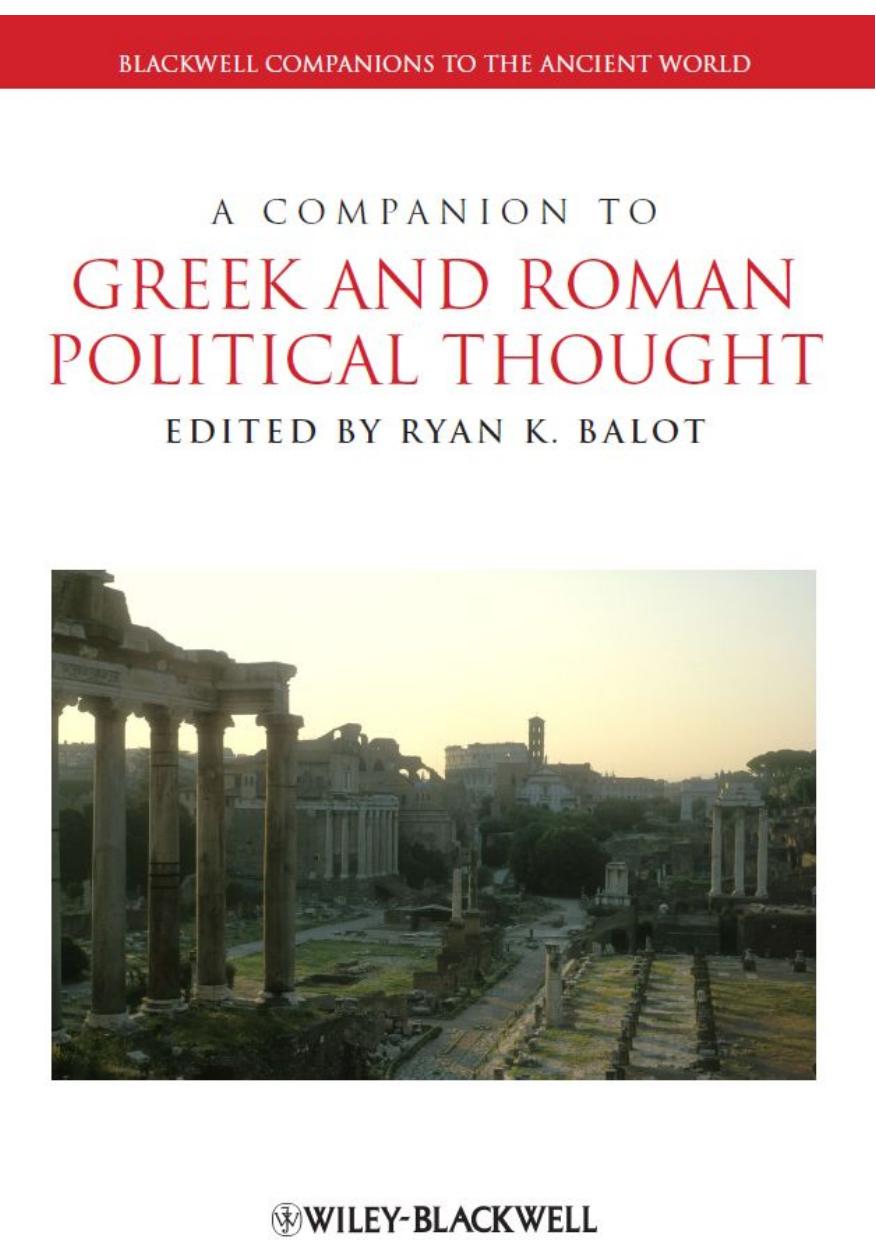A Companion to Greek and Roman Political Thought by Balot Ryan K

Author:Balot, Ryan K.
Language: eng
Format: epub, pdf
Publisher: Wiley
Published: 2012-10-21T04:00:00+00:00
FURTHER READING
For an excellent overview of the period from the consulship of Cicero to the aftermath of his return from exile see Wiseman 1994a, 1994b; for accounts with a biographical focus on Cicero, see Gelzer 1969: 97-152, Rawson 1975: 89-121, and Mitchell 1991: 63-168, and on his exile see G. Kelly 2006 (ch. 4.4); the best treatment of Clodius is Tatum 1999. On the adoption of mourning and the use of supplication as instruments of “popular justice,” see esp. Lintott 1999: 16-20; on these and other means used to arouse righteous indignation (invidia) against abusive individuals, see Kaster 2005a: 96-9; and on the “ritualized” nature of public life in the late republic, see Flaig 2003. The political role of “the crowdin Rome in the late republic” and its management in formal assemblies (contiones) and elsewhere have been much debated in the last two decades, and will continue to be debated: see esp. Vanderbroeck 1987; Holkeskamp 1995: 25 ff; Pina Polo 1996; Laser 1997: 138-82; Millar 1998; Mouritsen 2001; Morstein-Marx 2004. On demonstrations at the games and shows, see Nicolet 1980: 363-73, Edwards 1993: 110-19, Leach 2000 (treating the games discussed above), Stark 2000; on the “theatricality” of Roman political culture more generally, see esp. Bartsch 1994.
NOTES
1 For a discussion of the political passions, from a normative point of view, in the thought of (especially) Thucydides, Plato, and Aristode, see Ludwig, this volume, chapter 19.
2 The same story is told, with minor variations in detail, in Red. sen. and Red. pop. (both Sept. 57), Dom. (Oct. 57), and Sest. (Mar. 56); elements appear in all the “post return” speeches broadly so called, most importantly Pis. (late summer 55), and in the important political apologia addressed to Cornelius Lentulus, Cicero’s main supporter in 57 in Ram. 1.9 (esp. 13-14: late 54). On the genesis of the story, and its often misleading character, see Kaster 2006: 1-14, with further refs.
3 That he “alone” was responsible for saving the Republic is among the notes Cicero strikes most insistendy, both in his own voice (e.g., Ram. 5.2.6-7, Prov. cons. 23, Pis. 6, 21, cf. Sull. 33-4, Rep. 1.7) and esp. in reporting the view of others (e.g., Att. 1.19.7, similarly Att. 2.1.6; Red. sen. 29, Red. pop. 5, 16-17, Dom. 73, 122, 132, Sest. 129, Har. resp. 58, Prov. cons. 43, 45, Pis. 23, 34, Mil. 39, 73).
4 The euphemism appears at Sest. 67; cf. below at note 5.
5 On Clodius’ legislation regarding the auspices see Kaster 2006: 194-6, with further refs.; on the censorship, Tatum 1999: 133-5. On the legal status of the Catilinarians’ execution see Ungern-Sternberg 1970: 86 ff, esp. 123-9; Drummond 1995: esp. 95 ff; Berry 1996: 178. For Cicero’s regret at his decision to leave Rome see esp. Cic. QFr. 1.4.4, Fam. 14.3.1-3. For Pompey’s equivocations and evasions in the period leading to Cicero’s departure see Cic. Pis. 77, Q_Fr. 1.4.4, Att. 10.4 3 (written in April 49 but referring to the events of 58); Plut. Cic. 31.2; Cass. Dio 38.17.3; cf.
Download
A Companion to Greek and Roman Political Thought by Balot Ryan K.pdf
This site does not store any files on its server. We only index and link to content provided by other sites. Please contact the content providers to delete copyright contents if any and email us, we'll remove relevant links or contents immediately.
| Africa | Americas |
| Arctic & Antarctica | Asia |
| Australia & Oceania | Europe |
| Middle East | Russia |
| United States | World |
| Ancient Civilizations | Military |
| Historical Study & Educational Resources |
The Daily Stoic by Holiday Ryan & Hanselman Stephen(3301)
The Fate of Rome: Climate, Disease, and the End of an Empire (The Princeton History of the Ancient World) by Kyle Harper(3055)
People of the Earth: An Introduction to World Prehistory by Dr. Brian Fagan & Nadia Durrani(2728)
Ancient Worlds by Michael Scott(2682)
Babylon's Ark by Lawrence Anthony(2673)
The Daily Stoic by Ryan Holiday & Stephen Hanselman(2569)
Foreign Devils on the Silk Road: The Search for the Lost Treasures of Central Asia by Peter Hopkirk(2456)
India's Ancient Past by R.S. Sharma(2450)
MOSES THE EGYPTIAN by Jan Assmann(2412)
The Complete Dead Sea Scrolls in English (7th Edition) (Penguin Classics) by Geza Vermes(2277)
The Earth Chronicles Handbook by Zecharia Sitchin(2226)
Lost Technologies of Ancient Egypt by Christopher Dunn(2223)
24 Hours in Ancient Rome by Philip Matyszak(2078)
Alexander the Great by Philip Freeman(2064)
Aztec by Gary Jennings(2021)
The Nine Waves of Creation by Carl Johan Calleman(1915)
Curse Tablets and Binding Spells from the Ancient World by Gager John G.;(1860)
Before Atlantis by Frank Joseph(1849)
Earthmare: The Lost Book of Wars by Cergat(1823)
